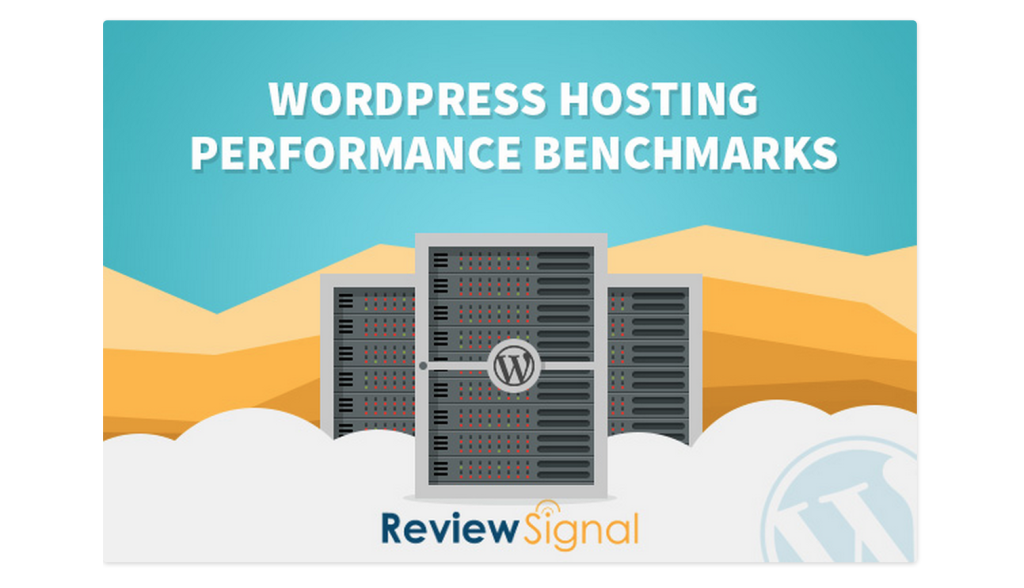On the web there’s no shortage of companies to choose from. Unfortunately choosing a host often is a matter of trial and error because it’s difficult to separate the quality providers from the subpar companies. Even Googling for web hosting reviews often is useless as most review sites are owned by hosting companies and filled with affiliate links. In other cases, many hosting brands are owned by the same parent company, making it difficult to escape issues caused by your current host.
Fortunately Review Signal by Kevin Ohashi has published an extensive post discussing WordPress hosting benchmarks on a variety of hosts. In terms of evaluating the companies, the primary focus was on peak performance and consistency of service. The data from each host was gathered over a month to ensure that the data was accurate.

Rather than just installing WordPress on hosting accounts blindly, Review Signal also went to the hosting providers directly and worked with them to ensure that every provider was using a uniform setup even if it required customizing security rules or performing other administrative work normally not required by the average customer.
Rather than repeating the entire report, below are a few key takeaways from the data:
Sustained Traffic Tests
The Laggards
The first hosts to fail in testing, with only 100-1000 concurrent users over 30 minutes were Bluehost, DreamHost and Cloudways (both on Digital Ocean and AmazonAWS). According to the tests, DreamHost failed almost immediately due to a security mechanism being triggered due to the testing script with DreamHost being unwilling to help resolve the issue.
Also, it’s important to note that Cloudways serves as an overlay to help make it easier to manage AWS and Digital Ocean instances. With any unmanaged cloud service, whenever you add an overlay to simplify operations, that can hinder performance. Ultimately hosting is only as good as it’s weakest link making it important to look for providers which offer as lean a stack as permissible.
The Winners
In the second round of tests for sustained loads of 500-2000 concurrent users over 30 minutes, the winners were: Kinsta, Pantheon and Media Temple. GoDaddy, which recently bought out Media Temple also made it to the top of the test results.
Surge Tests
The Laggards
The first providers which floundered in the tests of 1-1000 concurrent users over 60 seconds were Bluehost, DreamHost and Nexcess. With DreamHost these issues may have been triggered by the hosts security limits, meaning that in a real world environment, DreamHost might hold up better with normal traffic. Nexcess however buckled after only 30 seconds of traffic.
Although not necessarily a huge issue, Cloudways had error/timeout rates between 0.5%-2%. although they held out in this round, if you’re looking for hosting built for mission critical environments, this can be significant sticking point.
In the second round of testing with 1-2000 concurrent users over 60 seconds, Cloudways completely failed as did Bluehost, DreamHost, Nexcess and PressLabs.
The Winners
At the start of the surge testing, for 1-1000 concurrent users over 60 seconds, the winners were A Small Orange, FlyWheel, GoDaddy, Kinsta, LightningBase, MediaTemple, Pagely, Pantheon, SiteGround, WebSynthesis which all had near perfect results in this round.
For the tests involving 1-2000 concurrent users over 60 seconds, the winners were: A Small Orange, FlyWheel, GoDaddy, Kinsta, LightningBase, MediaTemple, Pagely, Pantheon and WebSynthesis. Those hosts all had error rates around 0.5% or lower.
Uptime Measurement
In the tests by Review Signal, none of the hosts tested had uptime lower than 99.5%. Other than MediaTemple and Bluehost, all the hosts had over 99.9% uptime. To put this in perspective, 99.5% uptime is 3.5 hours of downtime per month. 99.9% is <45 minutes of downtime per month.
Although this wasn’t mentioned on the Review Signal tests, when evaluating a web host, you shouldn’t ever take their service level agreement (SLA) guarantees at face value. This is because it’s fairly easy for hosts to fudge the numbers and make unrealistic promises. Hosts often guarantee uptime, but often the fine print of those guarantees makes it nearly impossible for a customer to collect on a claim.
Choosing the Right Host
As with most things in life, there’s no right or wrong answer when it comes to choosing a web host. As web development is such a vast field, finding a host to fit your needs can only be done by considering multiple factors. If you’re looking for a way to make better decisions, SitePoint has a primer on the considerations you should keep in mind when shopping for a hosting company.
 Charles Costa
Charles CostaCharles Costa is a content strategist and product marketer based out of Silicon Valley. Feel free to learn more at CharlesCosta.net.



